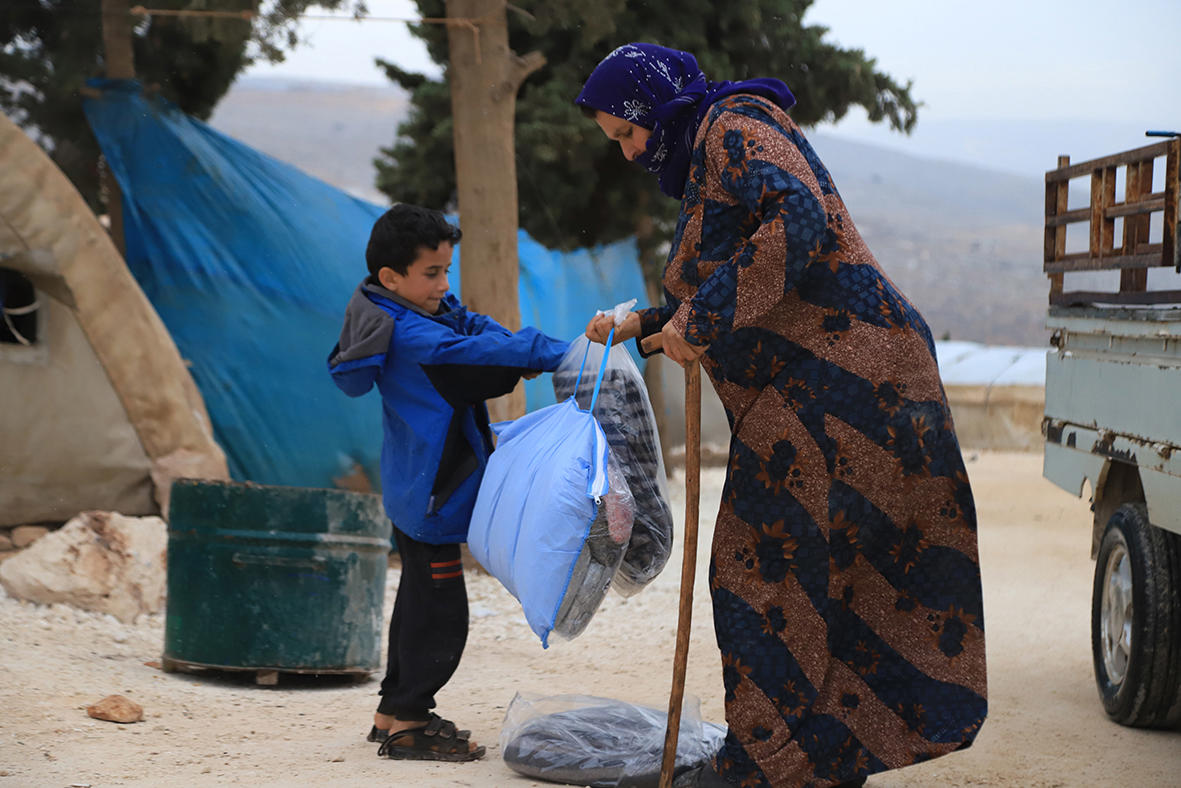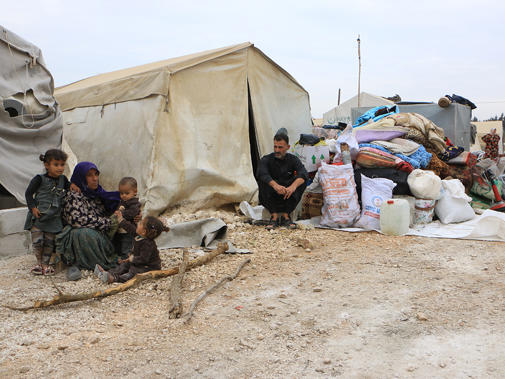Rasmia Abdullah* is haunted by the memory of a young boy who lived in her building until an air strike reduced it to rubble.
The blast killed the boy’s entire family; the child survived because, like Dr Abdullah, he happened to be out at the time of the raid.
All she knows of his fate is that he has gone to live with distant relatives.
‘I’ve witnessed countless stories like his, seen so many children who have lost their parents,’ says Dr Abdullah.
‘But what happened to that boy affected me deeply. I knew the family and now the child is not even living with close relatives…’
We can see people are hungry, children are struggling with malnutritionDr Abdullah
The boy is one of millions of children whose lives have been torn apart by Syria’s intractable, brutal civil war. He’s a civilian, displaced and damaged. He’s one of Dr Abdullah’s people.
Medical professionals must remain non-partisan – even as war becomes personal.
Yet, medical neutrality in the legal sense was one of the first casualties of the civil conflict. Right from the start of hostilities, hospitals and medical centres were targeted as alleged hideouts for armed groups and terrorists.
Doctors were arrested, even ‘disappeared’, for trying to do their jobs. The BMA wrote to president Bashar al-Assad in 2013 to protest about the death in custody of British-born orthopaedic surgeon Abbas Khan.
Dr Khan had been detained for 13 months, and reportedly tortured, for tending to injured civilians. Health workers resorted to what they called ‘clandestine medicine’. In one northern area, MSF (Médecins Sans Frontières – Doctors Without Borders) used a cave, then a farmhouse, as an emergency department, complete with operating theatre.
Last bastion
Dr Abdullah works in a rebel-held area in north-west Syria, straddling Idlib and Aleppo provinces.
It’s the last opposition stronghold and more than half of the four million people in the region are displaced, many living in overcrowded camps.
They have all been displaced several times, as have many of the medics who serve them. More than half of Syria’s 22 million people have fled their homes since 2011.
Government forces have made little distinction between civilians and combatants in their use of aerial bombardments, chemical weapons and medieval sieges on Syria’s ruined cities.
 COLD COMFORT: A refugee camp in north-west Syria
COLD COMFORT: A refugee camp in north-west Syria
In north-west Syria, many people live cheek by jowl under tents and tarpaulins, often without regular water supply or proper toilets.
Winter brings fresh torments: mud and freezing temperatures. One camp, Deir Hassan, west of Aleppo, is home to 120,000 people.
Even the camps and their humanitarian support are seen as fair game for air strikes and bombardments. Dr Abdullah works for MSF, running mobile clinics in muddy cabins in these camps, providing general health care, vaccinations and treatment for conditions such as diabetes.
She also checks regularly on pregnant women whose antenatal care is generally confined to the camps. ‘The situation of the people here is really difficult: their living conditions must be among the worst in the world,’ says Dr Abdullah.
‘Their tents are really close to one another. We can clearly see that people are hungry, that children are struggling with malnutrition.’
Lack of safe water
Protracted conflict has left the health system in the north-west on its knees.
Pressure on scant resources and depleted medical teams is building as military offensives continue to drive displaced people further north, into ever more overcrowded areas. Even health centres have had to be relocated.
Recent shortages of safe water in the region have meant conditions such as diarrhoea, hepatitis and scabies are rife in the camps, prompting MSF to scale up its water, sanitation and hygiene response. COVID has only exacerbated the local health crisis.
 COLD COMFORT: Displaced people receive winter supplies from MSF
COLD COMFORT: Displaced people receive winter supplies from MSF
By mid-October, MSF was reporting its health facilities in the north-west could not keep pace with demand for oxygen or intensive care.
Less than 3 per cent of the population of north-west Syria was fully vaccinated at the time of writing. Dr Abdullah says she and her team have been stepping up their vaccine promotion: many are wary of the COVID jab. And all the while, another crisis is building.
Most people in the camps have suffered trauma; many children have continence problems. Dr Abdullah’s team has a mental health specialist but the needs are vast.
‘These are children who have witnessed war, shelling and all the stress that comes with that, and many are orphans,’ says Dr Abdullah.
‘A lot of the adults have injuries, some have lost limbs. And now they are living in poverty, and no one can provide them with the care they really need. Most people living in this area are affected psychologically – including us medics.’
Medical personnel killed
In Syria, it seems, the rules of war do not apply. The NGO Physicians for Human Rights says it has ‘corroborated 600 attacks on at least 350 separate facilities and documented the killing of 930 medical personnel’ between March 2011 and June 2021.
Often, rockets are fired twice with a few minutes between attacks. This ‘double-tap’ approach deliberately targets those who rush to help those injured in the first attack.
Their living conditions must be among the worst in the worldDr Abdullah
So medics live in fear for their lives, and patients are fearful of being in hospital buildings which remain within the gun sights of government forces.
‘I’ve lost many colleagues, doctors and nurses, in the conflict, and some not too long ago,’ says Dr Abdullah.
‘We are impartial and independent, which means that we provide medical assistance to people regardless of their religion, gender, even their ethnicity and political affiliation. That humanitarian and medical work – and our staff – have to be protected, so we can keep doing our job.’
For most of her professional career, all Dr Abdullah has known is conflict. She could leave, as many medical professionals have done. Sometimes, the temptation to start a new life abroad is strong.
I’ve lost many colleagues, doctors and nurses, in the conflictDr Abdullah
‘We have this dilemma all the time, between our duty and our desire to support our community, and the opportunity to leave and have a better quality of life elsewhere,’ she says.
‘But getting support and solidarity from the outside world gives us the motivation to continue. And it makes us believe, again, that the values of humanity do still exist.’
Repeated international attempts to broker peace in Syria – efforts which have persisted for almost as long as the conflict – have failed to yield a settlement.
Dr Abdullah is committed to her people: their struggle is hers. So, for now, for the sake of the little boy from her old apartment block, she’s staying put.
‘I want to serve my community. I feel for my people because I am part of them. We are part of the same struggle. Now’s the time when they need me the most.’
* Name changed to protect identity
Images courtesy of Médecins Sans Frontières

